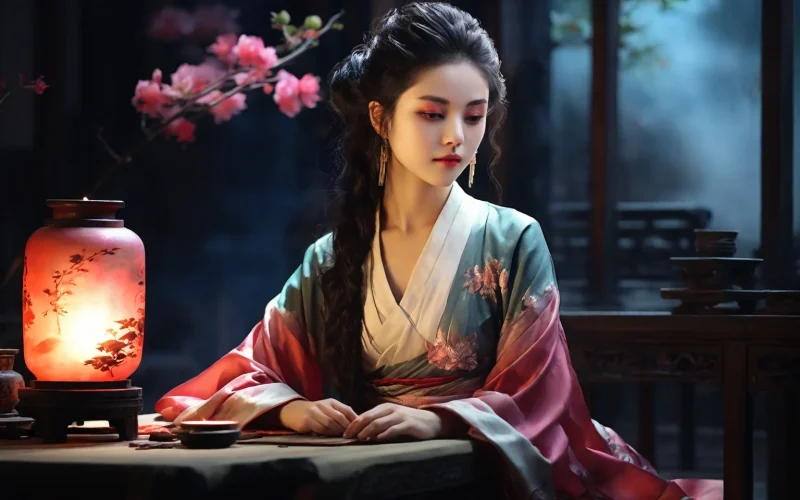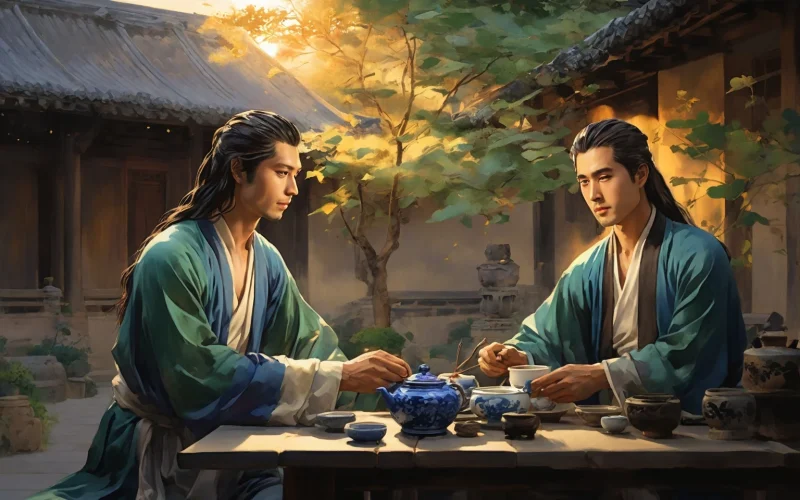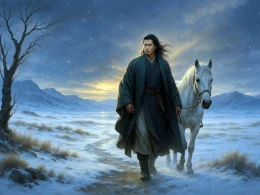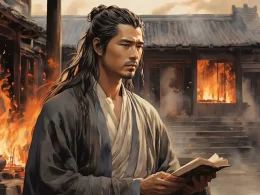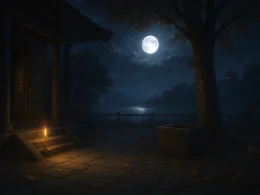Often looking back to her shadow by cold lamplight,
She only sees the dusty loom drowned in dark night.
Having never received news from her husband dear,
She blames the fortune-teller to say he'd appear.
Original Poem
「望夫词」
施肩吾
手爇寒灯向影频,回文机上暗生尘。
自家夫婿无消息,却恨桥头卖卜人。
Interpretation
This poem depicts a woman's prolonged wait for her absent husband through delicate imagery and psychological depth. The Tang Dynasty poet Shi Jianwu masterfully captures her growing isolation and despair, transforming personal longing into universal emotional truth.
First Couplet: "手爇寒灯向影频,回文机上暗生尘。"
Shǒu ruò hán dēng xiàng yǐng pín, huíwén jī shàng àn shēng chén.
Lighting the cold lamp, she turns to her shadow in despair, While dust gathers silently on the loom meant for love's prayer.
The cold lamp illuminates her physical and emotional isolation, while the abandoned palindrome loom - traditionally used to weave messages for absent lovers - becomes a powerful symbol of frozen time and broken communication.
Second Couplet: "自家夫婿无消息,却恨桥头卖卜人。"
Zìjiā fūxù wú xiāoxi, què hèn qiáotóu mài bǔ rén.
No word comes from her husband, no promise kept, Now she curses the fortune-teller where the bridge steps.
The woman's despair turns outward as she blames the diviner who failed to predict her husband's return. The bridge, typically a meeting place, becomes ironically symbolic of her dashed hopes and severed connection.
Holistic Appreciation
This poem skillfully portrays a woman's anxiety over her husband's prolonged silence, profoundly reflecting complex inner emotions. Through meticulous details like the cold lamp and idle loom, the poet delicately captures the waiting heart's turmoil, while the introduction of the fortune-teller creates an unexpected narrative twist that deepens the poetic meaning. Rather than directly expressing longing, the poet reveals disappointment and pain through resentment toward false prophecies. With concise yet refined language and nuanced emotion, the poem vividly conveys the loneliness and yearning of prolonged anticipation.
Artistic Merits
- Subtle Emotional Expression: Through carefully chosen domestic details, the poet reveals the woman's isolation and anxiety during her long wait. The images of "facing her shadow by the cold lamp" and "dust gathering on the palindrome loom" poignantly depict her inner torment.
- Contrast Technique: The juxtaposition of the "cold lamp" with the "fortune-teller" intensifies the woman's inner conflict—her hope for her husband's return clashes with resentment toward the diviner's empty promises.
- Foreshadowing and Twist: The gradual narrative progression culminates in revealing that the woman's bitterness targets not her husband but the deceitful prophecies. This twist adds layers and emotional depth to the poem.
Insights
The poem reminds us that true emotions often lie beneath surface appearances. Through details and narrative development, we witness the contradictions and anxieties hidden within the waiting wife's heart. In life, we too may project pain onto unrelated targets—this work inspires us to recognize and empathize with the genuine feelings concealed behind outward resentment.
Poem translator
Xu Yuanchong (许渊冲)
About the Poet
Shi Jian-wu (施肩吾), 780 - 861 AD, was a poet and Taoist scholar of the Tang Dynasty. He was a native of Tongxian Village (later known as Xiande Village) in Fen Shui County, Muzhou. In 820 AD, he passed the imperial examination and became the first Zhuangyuan (top scholar) from the Hangzhou region.





